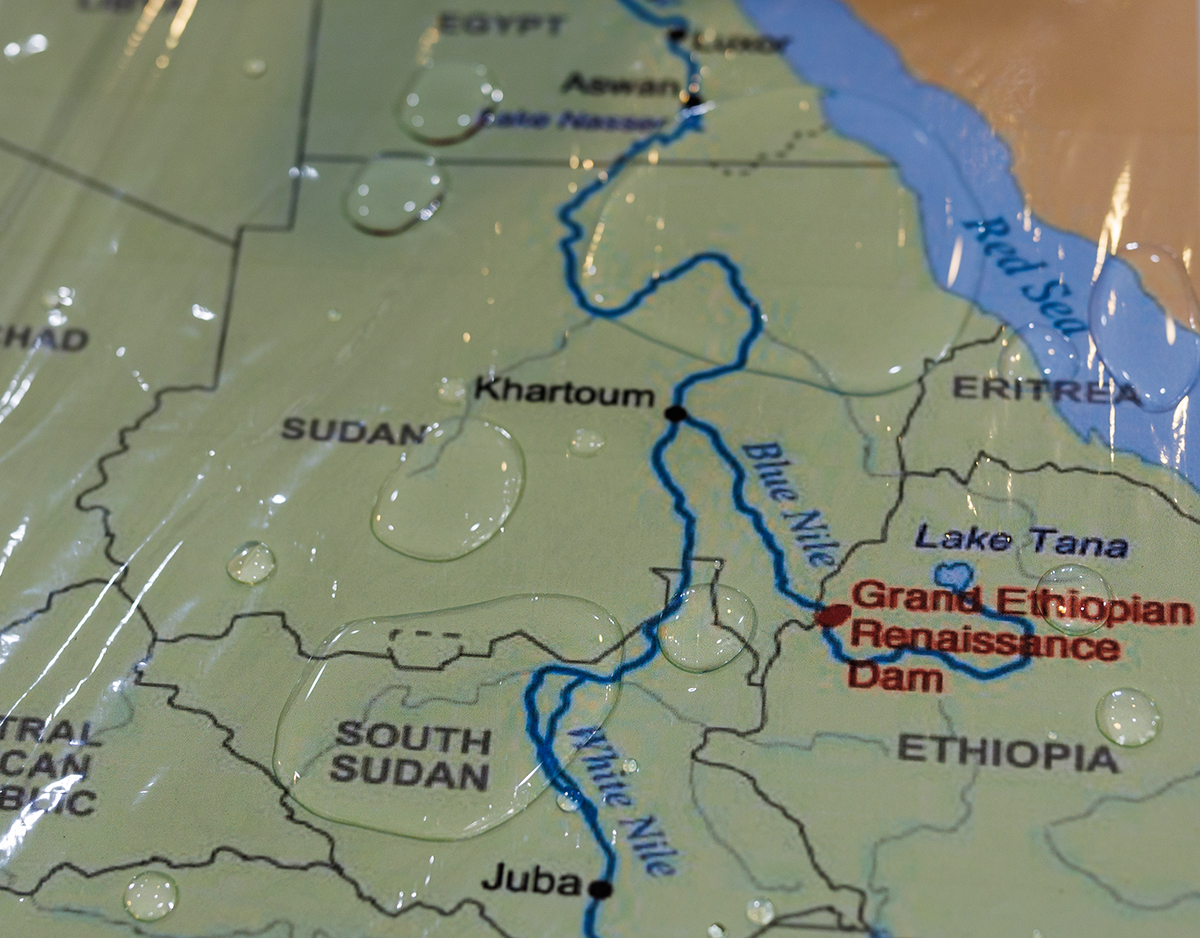UCLA professors host webinar series on water disputes in Nile River Basin

Professors from the UCLA Henry Samueli School of Engineering and Applied Science and the political science department collaborated to organize an interdisciplinary webinar series. The webinar invites fact-based debate on solutions to an ongoing international disagreement regarding the use of the Nile’s resources. (David Rimer/Assistant Photo editor)
By Rania Soetirto
Jan. 21, 2022 5:38 p.m.
Two UCLA professors hope to foster interregional cooperation among countries following the rise of water management disputes in the Nile River Basin and seek sustainable solutions through a joint webinar series.
There have been disagreements in the region over the Grand Ethiopian Renaissance Dam. Built on the Blue Nile River in Ethiopia, the dam has created tensions among states that depend on the Nile’s waters, out of fear that it might block the flow of the river toward downstream countries. However, in Ethiopia, the hydroelectric dam is envisioned as a project that would help push forward its economic progress by providing access to much-needed electricity for millions of homes and selling to other countries.
Running from October 2021 to March 2022, “The Nile River Basin in Crisis: Water Sharing and Transboundary Conflict or Cooperation” is a 10-part webinar series hosted by the Henry Samueli School of Engineering and Applied Science and the UCLA African Studies Center. The series invites practitioners and scholars to present research and alternatives to the ongoing Nile River dispute, which involves the surrounding countries of Egypt, Ethiopia and Sudan.
Mekonnen Gebremichael, one of the series’ co-organizers and a civil and environmental engineering professor, said the series was developed in hopes of creating a neutral area of conversation to identify solutions to the crisis.
Gebremichael said he believes there is a solution to the dispute and wants the webinar to be an opportunity for researchers and scholars to present their findings to stakeholders in order to address and improve understanding of different dimensions of the issue.
It took months for him and fellow organizer Edmond Keller to organize the series as they wanted to make sure they were looking at the issue from the perspectives of different fields, he added.
Keller, a distinguished professor emeritus of the political science department and former director of the ASC, said he first became interested in the project because he wanted to support Gebremichael’s efforts. He contributed to the social science and political aspect of the webinar, while Gebremichael dealt with hard sciences to create a multifaceted approach to the issue.
“So between (Gebremichael) and myself, we did some digging online and in libraries and began to see how we could do this and collaborate,” said Keller, who is also director of the UCLA Globalization Research Center-Africa.
Gebremichael said he believes the webinar is an ideal project to foster cooperation between countries and discuss the management of other river basins to develop the best alternatives.
Keller said each webinar has an average of 70 to 100 participants. He added that some of the attendees have been government officials and policy experts from nations involved in the dispute.
Keller said he hopes the webinar will reach political leaders around the world who have the influence to mitigate the crisis.
Key stakeholders and government officials have also shared their perspectives on the issue in the webinar, Gebremichael added. However, he said, one of the largest challenges in hosting the webinar was to hold a healthy debate.
Since many of the participants are stakeholders from Egypt, Ethiopia and other involved countries, the conversation could become difficult, especially when emotions are running high, he added.
“You have all these emotions and nationalistic feelings, and when you discuss science, if it’s driven by emotion, it’s usually difficult,” he said.
Gebremichael said they have had presenters cancel their presentations because of the webinar’s politically sensitive topic. Selecting speakers who could engage the audience with a balanced point of view also proved to be another challenge, he added.
Ana Elisa Cascão, a researcher and one of the webinar’s guest speakers, said finding a solution would require an immense amount of goodwill from the states involved, which she thinks has been lacking. It is difficult to pinpoint only one solution as the problem does not lie only in water management but also in sharing resources and borders, she added.
Cascão added that although there have already been many attempts to start cooperation and agreements between these countries, she believes it has not been enough because it does not provide a solution where there is a division on how to share the water of the Nile.
Cascão said she had taken great lengths to retain middle ground and neutrality when presenting her talk at the webinar.
“I’ve never been as careful to prepare a presentation like this one, in the sense of picking a middle ground, not trying to offend any of the leaders,” she said.
Gebremichael said the last session of the webinar in March would focus on discussing and presenting solutions based on all the knowledge they have learned throughout the series.
Furthermore, Gebremichael thinks the webinar would serve as a great case study for faculty and students while garnering new research ideas at UCLA. He hopes the webinar would prompt future interdepartment collaborations at UCLA to further tackle global issues, he added.
“I’m hoping that now at UCLA (and) we, the faculty from various departments in the college, will get together and start tackling these kinds of global issues,” he said.


